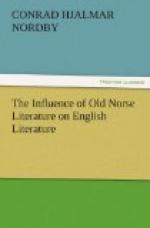To get the full benefit of the comparison of the old and the new, let us set in conjunction with these versions a severely literal translation of the Edda strophes themselves:
Hail, O Day, Hail, O Sons of the Day, Hail Night and kinswoman! With unwroth eyes look on us here and give to us sitting ones victory. Hail, O Gods, Hail, O Goddesses, Hail, O bounteous Earth! Speech and wisdom give to us, the excellent twain, and healing hands during life.
These stages in the progress of the gold from mine to mint furnish their own commentary. The finished product will pass current with the most exacting of assayers, as well as gladden the hearts of the poor one whose hand seldom touches gold.
If the skill of the poet in this case have merited resemblance to that of the refiner of gold, what name less than alchemy can characterize his achievement in the rest of this scene? From the first words of Brynhild’s life-story:
I am she that loveth; I was born of the earthly folk;
to the tender words that tell of the coming of another day:
And fresh and all abundant abode the deeds of Day,
there is a succession of beautiful scenes and glorious speeches such as only a master of magic could have gotten out of the original story. The Eddaic account of the Valkyr’s disobedience to All-Father, pictures a saucy and self-willed maiden. Sentence has been pronounced upon her, and thus the story continues: “But I said I would vow a vow against it, and marry no man that knew fear.” The Voelsunga Saga gives exactly the same account, but the poetic version of Morris saves the maiden for our respect and admiration. It is not effrontery, but repentance that speaks in the voice of Brynhild here:
The thoughts of my heart overcame
me, and the pride of my wisdom and
speech,
And I scorned the earth-folk’s Framer, and
the Lord of the world I must
teach.
In the Icelandic version, Odin makes no speech at the dooming, but Morris puts into his mouth this magnificent address:
And he cried: “Thou
hast thought in thy folly that the Gods have
friends and foes,
That they wake, and the world wends onward, that
they sleep, and
the world slips back,
That they laugh, and the world’s weal waxeth,
that they frown and
fashion the wrack:
Thou hast cast up the curse against me; it shall
aback on thine head;
Go back to the sons of repentance, with the children
of sorrow wed!
For the Gods are great unholpen, and their grief
is seldom seen,
And the wrong that they will and must be is soon
as it hath not been.”
(P. 141.)
Morris has here again exercised the poet’s privilege of adding to the story that was the pride of an entire age, in order to serve his own the better. If he was wise in these additions, he was no less wise in subtractions and in preservations. The saga has a long address by Brynhild, opening with mystical advice concerning the power of runes, and closing grandly with wise words that sound like a page from the Old Testament. The former find no place in Sigurd the Volsung, but the latter are turned into mighty phrases that wonderfully preserve the spirit of the original.




